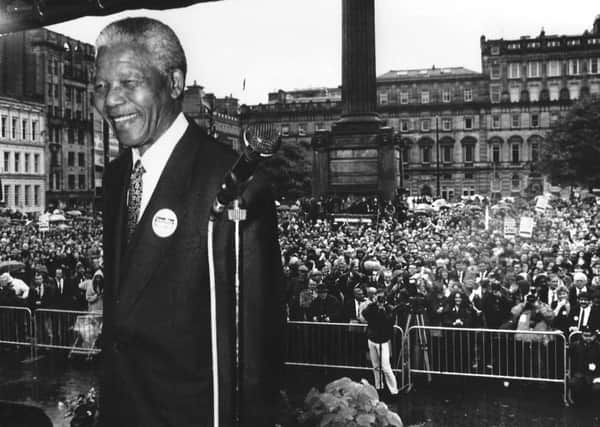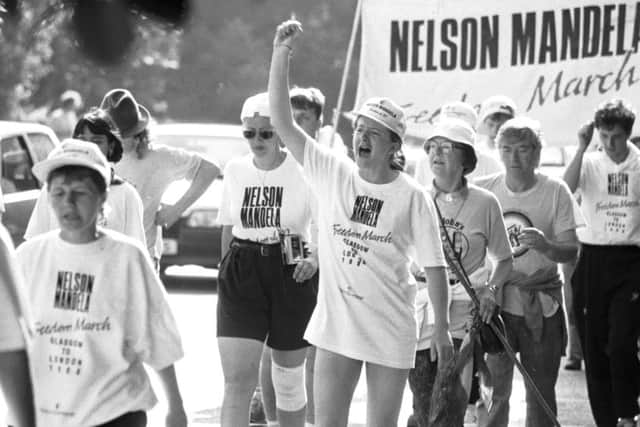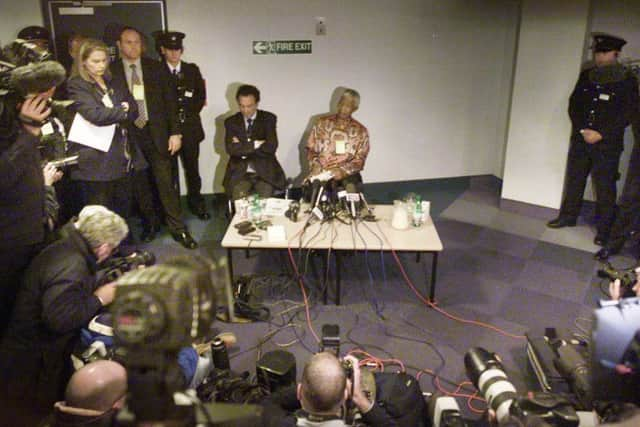Mandela's historic Glasgow trip remembered on 100th birthday


Mandela came to Glasgow in 1993 to thank the city for its support during the 27 years he spent in prison
as he fought South Africa’s Apartheid regime.
Nelson Mandela praised the “Citizens of Glasgow” for being the first in the world to offer him the Freedom of the City in 1981. Where Glasgow led, many others followed.


Advertisement
Hide AdAdvertisement
Hide AdThis hugely symbolic gesture was made while Mandela was still being condemned as a terrorist as he challenged racial segregation in his country.
The South African government at the time refused him permission to leave prison to accept the honour, fuelling the worldwide campaign to set him free.
In 1986, the city renamed St George’s Place, the location of the South African consulate, as Nelson Mandela Place in his honour.


During his visit to Glasgow, Mandela gave a speech thanking the city for its efforts: “Whilst we were physically denied our freedom in the country of our birth, a city, 6000 miles away, and as renowned as Glasgow, refused to accept the legitimacy of the apartheid system and declared us to be free, you, the people of Glasgow, pledged that you would not relax until I was free to receive this honour in person.
Advertisement
Hide AdAdvertisement
Hide Ad“I am deeply grateful to you and the anti-apartheid movement in Scotland for all your efforts to this end,”
Activist Brian Filling, then founding chair of the Scottish Committee of the Anti-Apartheid Movement and now Honorary Consul for South Africa in Scotland, was instrumental in getting Glasgow to show support for Mandela amid the hostile climate against Mandela.
Margaret Thatcher described viewed the African National Congress as a terrorist group and it is now known that House of Commons speaker John Bercow was part of a group of young Conservatives who called for Mandela to be hanged.
David Cameron was later compelled to apologise for his party’s stance on Mandela when giving tributes to the late leader.
Advertisement
Hide AdAdvertisement
Hide AdIn Glasgow, a small group of activists had been working from the 60s onwards supporting the ANC and Mandela as its figurehead.
In 1979, a lunch with the South African ambassador hosted by Glasgow Lord Provost David Hodge was a turning point with furious campaigners descending on City Chambers. Catering staff threatened not to prepare the food.
As a result, Lord Provost Michael Kelly to put in place a motion to give Mandela the feedom of the city in 1981.
He also launched a declaration the following year, signed by 2,500 city mayors, calling for Mandela’s release from prison.
Advertisement
Hide AdAdvertisement
Hide AdIt was against this backdrop that Nelson Mandela Place in the city centre came into being, in a huge embarrassment to the South African consul.
A year after Nelson Mandela’s visit to Glasogw, Mandela became the first black president of the Republic of South Africa, which he led between 1994 and 1999.
Mandela returned to Glasgow in 2002, when he attended a press conference with Abdelbaset Al-Megrahi, the convicted Lockerbie bomber, at Barlinnie Prison.